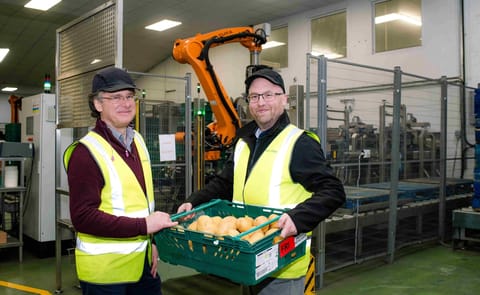Is this the reason for our unhealthy eating?
主标签
Is this the reason for our unhealthy eating?

An increasing number of people in the western world are overweight. Why? Scientists have been seeking an answer to this question for some time now. Researcher Rachelle de Vries sheds (quite) some light: we may be pre-programmed. That is: we remember better where to find food that is rich in calories than food that has fewer calories.
Bias
De Vries (Indonesian with Dutch roots) obtained her Ph.D. last week in a study entitled Foraging minds in modern food environments. She used experiments to show that our brain has a tendency (in scientific terms: has a bias) to recall the location of calorie-rich foods better than the location of foods that are lower in calories. This bias negatively impacts our buying and thus eating behavior.
Our brain having this bias is a result of our evolution. When humans were hunter/gatherers, energy-rich food was in low supply, and remembering its whereabouts offered an advantage in the struggle for survival, says De Vries. This likely is why the brain developed in this direction. And this bias still applies, even now that calorie-rich food is in abundant supply.
Chips De Vries conducted lab experiments as well as experiments during Lowlands Science 2018. Test subjects remember the location of calorie-rich products better. Fruits and vegetables are forfeited in favor of chips and fries. The bias remains, even when corrections are made for people’s preference for or familiarity with certain products. Moreover, this brain bias appears to be universal.
The way bias affects our buying behavior is more complex. Participants with a strong expression of the bias, expected to be able to find high-calorie foods more rapidly, De Vries explains. However, there was no difference in the time it took. It is about perception. And their perception was aligned with the level of their bias.
Rachelle de Vries:
This does not mean that we are all destined to become fat as a result of our memory.
Rachelle de Vries:
Rachelle de Vries:
Rachelle de Vries:
Bias
De Vries (Indonesian with Dutch roots) obtained her Ph.D. last week in a study entitled Foraging minds in modern food environments. She used experiments to show that our brain has a tendency (in scientific terms: has a bias) to recall the location of calorie-rich foods better than the location of foods that are lower in calories. This bias negatively impacts our buying and thus eating behavior.
Our brain having this bias is a result of our evolution. When humans were hunter/gatherers, energy-rich food was in low supply, and remembering its whereabouts offered an advantage in the struggle for survival, says De Vries. This likely is why the brain developed in this direction. And this bias still applies, even now that calorie-rich food is in abundant supply.
Chips De Vries conducted lab experiments as well as experiments during Lowlands Science 2018. Test subjects remember the location of calorie-rich products better. Fruits and vegetables are forfeited in favor of chips and fries. The bias remains, even when corrections are made for people’s preference for or familiarity with certain products. Moreover, this brain bias appears to be universal.
The way bias affects our buying behavior is more complex. Participants with a strong expression of the bias, expected to be able to find high-calorie foods more rapidly, De Vries explains. However, there was no difference in the time it took. It is about perception. And their perception was aligned with the level of their bias.
Rachelle de Vries:
"Subjects who think they will find calorie-rich products more easily will more readily buy these products or are more likely to visit a fast-food restaurant. There is a correlation between this readiness and eating behavior, between the bias and the frequency with which snacks are bought. This, in turn, is reflected in the BMI."Curtail
This does not mean that we are all destined to become fat as a result of our memory.
Rachelle de Vries:
"The bias is something we have, as an inheritance from the past, but we can still choose to eat healthily by curtailing and controlling this instinct. We are not at the mercy of this bias."Although, not everyone is equally successful at doing so. The good news is that you can train yourself to ignore your bias towards calorie-rich food. An example of such training is inhibitory control training that teaches you to not respond to images of high-calorie foods.
Rachelle de Vries:
"In my experiments, we saw that people with better self-control are also better protected against the unhealthy effects of the bias. But much depends on how strongly you are motivated to change your behavior."There are other options, however.
Rachelle de Vries:
"The food environment must be changed. In an environment with fewer calorie-rich products, the bias is activated less frequently."
Like to receive news like this by email? Join and Subscribe!
Get the latest potato industry news straight to your WhatsApp. Join the PotatoPro WhatsApp Community!
精选企业
Sponsored Content
Sponsored Content
Sponsored Content
Sponsored Content










